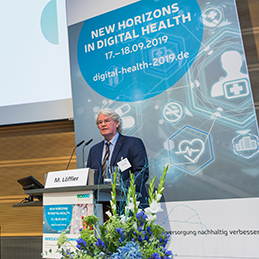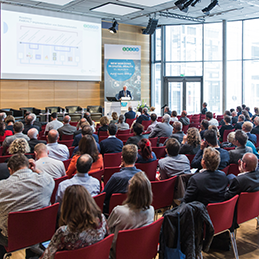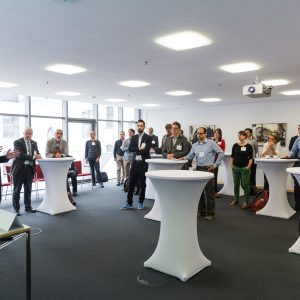
Agenda
2nd Congress by the SMITH Consortium of the Medical Informatics Initiative | June 28th – 29th 2022, dbb forum berlin
This was the program for the SMITH Congress 2022:
Image Sources: © Eventfotografie Schneider | Christian Schneider-Bröcker
Tuesday, 28th June 2022
Moderation: Hans-Peter Bröckerhoff, Founder and longtime editor of the trade magazine E-HEALTH-COM
10:00 - 10:30 | Press conference | Room Friedrichshain

Press conference
Hans-Peter Bröckerhoff
Moderator SMITH Congress 2022 “NEW SOLUTIONS IN DIGITAL HEALTH”
Founder and longtime editor of the trade magazine
Prof. Dr. Markus Löffler
Head of the SMITH Consortium,
Director of the Institute for Medical Informatics, Statistics and Epidemiology,
Leipzig University
Prof. Dr. Gernot Marx, FRCA
2nd Spokesman SMITH Consortium,
Head of the Digital Hub DISTANCE,
Spokesman of the Executive Board of the Innovation Center Digital Medicine,
Head of the Department for Intensive Care Medicine,
University Hospital RWTH Aachen
Prof. Dr. André Scherag
Congress President,
1st Spokesman SMITH Consortium,
Director of the Institute for Medical Statistics, Informatics and Data Science,
University Hospital Jena
Sebastian C. Semler
Director of TMF e.V. – Technology, Methods, and Infrastructure for Networked Medical Research
10:30 – 11:00 | Welcome coffee | Lichthof
11:00 - 11:15 | Opening | Atrium

Opening
Prof. Dr. Markus Löffler
Head of the SMITH Consortium,
Director of the Institute for Medical Informatics, Statistics and Epidemiology,
Leipzig University
11:15 - 11:30 | Welcoming speech from politics: Federal Ministry of Education and Research | Atrium

Welcoming speech from politics: Federal Ministry of Education and Research
Prof. Dr. Veronika von Messling
Ministerial Director and Head of the Life Sciences Department,
Federal Ministry of Education and Research
11:30 - 12:15 | Keynote lecture: Data-driven healthcare – Today’s research for tomorrow’s healthcare (English) | Atrium

Keynote lecture: Data-driven healthcare – Today’s research for tomorrow’s healthcare (English)
The awareness of healthcare being a data-intensive discipline is slowly leading to redesign of the processes of data capture, storage, exchange, and use. Implementing such redesigned processes is a socio-technical endeavour involving legal, ethical, professional and technical challenges. This largely takes place at local and regional level, while at a European scale requirements are laid out in projects, initiatives and regulations. This keynote will focus on reusable health data, addressing technical successes and failures, the need for capacity building in medical training and beyond, and the importance of medical informatics research. Evidence-based medical informatics and implementation science are key to establish and scale-up successful innovations. Examples of such innovations in the Netherlands will be presented, including data exchange among care recipients and care providers and the need for comprehendible language in digital communication. This will be related to the upcoming European Health Data Space regulations.
Ronald Cornet, PhD,
Associate professor; Principal Investigator
Medical Informatics
Amsterdam Public Health Research Institute
Amsterdam UMC
12:15 - 13:00 | Panel discussion: Digital medicine - From Europe to the region (English) | Atrium

Panel discussion: Digital medicine – From Europe to the region (English)
In early May 2022 the European Commission launched the European Health Data Space (EHDS), one of the central building blocks of a strong European Health Union. The objectives are to empower individuals through better digital access to their personal health data (including cross-board access), to unleash the potentials for digital health services and products and to set up strict rules for the use of individual’s non-identifiable health data for research, innovation, policy-making and regulatory activities.
In this session we want to discuss what the current status of the EHDS is and what to expect (practically). Next, we will ask where we see connections between the German activities and the EHDS. At a very practical level, how will citizens in urban and rural areas participate or benefit? To what extent is there a (foreseeable) compromise between all three objectives of the EHDS? Finally yet importantly, how can such a digital ecosystem be made sustainable and who is going to pay for it?
Ronald Cornet, PhD
Associate professor; Principal Investigator
Medical Informatics
Amsterdam Public Health Research Institute
Amsterdam UMC
Dr. Silke Haferkamp
Head of IT Division,
University Hospital RWTH Aachen
Dr. Christoph Klein
Policy Officer, Principal Administrator,
International cooperation, G20,
European Commission
Nick Schneider
Head of Division 511 –
New technologies and data use,
Federal Ministry of Health
Sebastian C. Semler
Director of TMF e.V. – Technology, Methods, and Infrastructure for Networked Medical Research
13:00 – 14:00 | Lunch break | Lichthof
14:00 - 14:30 | Strong Data Integration Centers inspire clinic and research | Atrium

Strong Data Integration Centers inspire clinic and research
Data Integration Centers are an essential part of the sustainable IT infrastructure with which the Medical Informatics Initiative creates the conditions for cross-site networking of research and healthcare. In Data Integration Centers, medical data is collected centrally at the site, its formats harmonized and made available for research. Data protection and data security have the highest priority.
Seven of the ten university medical sites participating in the SMITH Consortium have so far established a Data Integration Center, and three network partners are preparing to set one up.
In the short presentations of the session “Strong DConsoata Integration Centers inspire clinics and research”, the heads of the Data Integration Centers at the sites in Bonn, Leipzig, Halle, Essen and Hamburg will talk about the special features and achievements of the SMITH Data Integration Centers.
Data integration centers for local and national pandemic management
Dr. Felix Erdfelder
Acting Head of the Data Integration Center,
University Hospital Bonn
How can clinical researchers use the services of Data Integration Centers?
Dr. Thomas Wendt
Head of Data Integration Center,
Leipzig University Hospital
Tasks and Services of the trust office of the Halle Data Integration Center
Dr. Daniel Tiller
Head of Data Integration Center,
University Hospital Halle (Saale)
PROMs: Advantages of the Clinical Domain using the example of ePOS
Patient Involvement at the Data Integration Center Essen
Tobias Brieden
Head of Data Integration Center
University Medicine Essen
More than Data Sharing:
Electronic Data Capture as a Service of the Data Integration Centers
Dr. Jan Gewehr
Head of Research and Integrative Systems Department,
Business Unit IT,
University Medical Center Hamburg-Eppendorf
14:45 - 16:00 | Breakout Sessions: Outcomes of the SMITH Use Cases | Workshopräume

Breakout Sessions: Outcomes of the SMITH Use Cases
In one methodological and two clinical use cases, SMITH demonstrates the functionality and effectiveness of the established Data Integration Centers.
In the breakout sessions, small groups will present and discuss the results of the SMITH Use Cases that were achieved during the development and networking phase of the Medical Informatics Initiative.
After the Data Integration Center presentation, participants will be divided into three groups and directed to the respective workshop rooms for each use case. After each session, participants will switch workshop rooms. The sessions will be repeated three times each in order to be able to work in the small groups of participants.
Clinical Use Case ASIC –
Digital & innovative application for quality improvement in patients with acute respiratory failure
(Room Köpenick)
The clinical Use Case ASIC uses the treatment of patients with acute respiratory distress syndrome (ARDS) as example to show how intensive care can be improved by using already existing clinical data.
Prof. Dr. Gernot Marx
2nd Spokesman SMITH Consortium,
Head of the Digital Hub DISTANCE,
Spokesman of the Executive Board of the Innovation Center Digital Medicine ,
Head of the Department for Intensive Care Medicine,
University Hospital RWTH Aachen
Clinical Use Case HELP –
Experiences to digitally support responsible antibiotic therapy for staphylococcal bloodstream infections
(Room Kreuzberg)
The clinical Use Case HELP supports the targeted use of antibiotics to combat staphylococcal bloodstream infections.
Prof. Dr. Mathias Pletz
Director of the Institute for Infectious Medicine and Hospital Hygiene
com. Director of the Institute of Immunology
Jena University Hospital
Prof. Dr. Rainer Röhrig
Director of the Institute for Medical Informatics,
University Hospital RWTH Aachen
Prof. Dr. André Scherag
1st Spokesman SMITH Consortium,
Director of the Institute for Medical Statistics, Informatics and Data Science,
University Hospital Jena
Methodical Use Case PHEP –
From Data to Information to Knowledge – the Interface to Clinical Research (Room Friedrichshain)
The methodological Use Case PheP develops methods to automatically extract medical information from electronic patient records and provides a platform for distributed analysis.
Dr. Frank Meineke
IT Coordinator and Project Manager,
Institute for Medical Informatics, Statistics and Epidemiology,
Leipzig University
16:00 – 16:30 | Coffee break | Lichthof
16:30 - 17:30 | Advancement of the Medical Informatics Initiative in research and education: New professorships and Junior Research Groups in the SMITH Consortium | Atrium

Advancement of the Medical Informatics Initiative in research and education:
New professorships and junior research groups in the SMITH Consortium
One of the most important goals of the Medical Informatics Initiative is to promote young scientists. Well-trained specialists play a central role in the future of digitization in medicine. Specialized “data scientists” should both master the latest tools of informatics and be familiar with medical terminology so that they can meaningfully evaluate the growing volumes of data.
To sustainably promote research and teaching in medical informatics, the SMITH Consortium has established six new professorships in Bonn, Essen, Halle, Hamburg, Jena and Leipzig during the development and networking phase. Some SMITH sites have established junior research groups. The junior research groups of the consortium develop forward-looking perspectives on medical informatics issues and future scientists.
In this session, the professors and junior research group leaders of the Bonn, Essen, Halle, Hamburg, Jena and Leipzig sites will present their professorships and junior research groups.
Digital medicine at University Hospital Bonn
Prof. Dr. Stephan Jonas
Director of the Institute for Digital Medicine,
Faculty of Medicine,
University of Bonn
Towards predicting hyper-localized (neighborhood) virus load and virus variants from sewage data
Prof. Dr. Folker Meyer
Chair of Medical Informatics with a focus on Medical Data Science,
Institute for Artificial Intelligence in Medicine (IKIM),
University Hospital Essen
Bridges between research and care and between clinic and faculty at University Hospital Halle
Jun.-Prof. Dr. Jan Christoph
Scientific Director,
Data Integration Center / Working Group (Bio-)Medical Data Science,
University Hospital Halle (Saale)
Get to it – medical data finally in the practice!
Dr. Sylvia Nürnberg
Junior Research Group Leader Secondary Use of Healthcare Data,
Institute for Applied Medical Informatics,
University Medical Center Hamburg-Eppendorf
From AI assistance to digital didactics in medicine – the Medical Informatics Group at Jena University Hospital
Prof. Dr. Cord Spreckelsen
Chair of Medical Informatics,
Institute for Medical Statistics, Informatics and Data Science,
Jena University Hospital
Dr. Sasanka Potluri
Junior Research Group Leader “KI-LoV”,
Institute for Medical Statistics, Informatics and Data Science,
Jena University Hospital
Infrastructures for AI-based phenotyping
Prof. Dr. Toralf Kirsten
Chair of Medical Data Science,
Faculty of Medicine,
Leipzig University
Head of Medical Data Science Department,
Medical Informatics Center,
University of Leipzig Medical Center
Dr. Alexandr Uciteli
Junior research group leader “Terminology- and ontology-based phenotyping”,
Institute for Medical Informatics, Statistics and Epidemiology,
Leipzig University
17:30 - 18:00 | Closing dialogue | Atrium

Closing dialogue
The Data Integration Centers developed through the Medical Informatics Initiative have created an infrastructure that enables cross-location networking of research and healthcare. In addition to the focal points of the junior research groups and new professorships presented in the individual presentations, we would like to discuss how models of cooperation with the Data Integration Centers have already been designed or how they can be designed in the future. In addition, we would like to discuss whether and how the new professorships are involved in the teaching of human medicine and help shape this with a look at the “Master Plan for Medical Studies 2020”.
Jun.-Prof. Dr. Jan Christoph
Scientific Director,
Data Integration Center / Working Group (Bio-)Medical Data Science,
University Hospital Halle (Saale)
Prof. Dr. Stephan Jonas
Director of the Institute for Digital Medicine,
Faculty of Medicine,
University of Bonn
Prof. Dr. Toralf Kirsten
Chair of Medical Data Science,
Faculty of Medicine,
Leipzig University
Head of Medical Data Science Department,
Medical Informatics Center,
University of Leipzig Medical Center
Prof. Dr. Markus Löffler
Head of the SMITH Consortium,
Director of the Institute for Medical Informatics, Statistics and Epidemiology,
Leipzig University
Prof. Dr. Gernot Marx, FRCA
2nd Spokesman SMITH Consortium,
Head of the Digital Hub DISTANCE,
Spokesman of the Executive Board of the Innovation Center Digital Medicine ,
Head of the Department for Intensive Care Medicine,
University Hospital RWTH Aachen
Prof. Dr. Folker Meyer
Chair of Medical Informatics with a focus on Medical Data Science,
Institute for Artificial Intelligence in Medicine (IKIM),
University Hospital Essen
Dr. Sylvia Nürnberg
Junior Research Group Leader Secondary Use of Healthcare Data,
Institute for Applied Medical Informatics,
University Medical Center Hamburg-Eppendorf
Prof. Dr. André Scherag
Congress President,
1st Spokesman SMITH Consortium,
Director of the Institute for Medical Statistics, Informatics and Data Science,
University Hospital Jena
Prof. Dr. Cord Spreckelsen
Chair of Medical Informatics,
Institute for Medical Statistics, Informatics and Data Science,
Jena University Hospital
18:00 - 22:00 | Get-together | Lichthof

Get-together
Opportunity for mutual exchange in a relaxed atmosphere
Wednesday, 29th June 2022
Moderation: Hans-Peter Bröckerhoff, Founder and longtime editor of the trade magazine E-HEALTH-COM
10:00 - 11:30 | Impulses for the future of healthcare: Digital Hubs: Advances in Research and Health Care | Atrium

Impulses for the future of healthcare: Digital Hubs: Advances in Research and Health Care
The goal of the “Digital Hubs: Advances in Research and Health Care” is to develop digital innovations for regional healthcare. Data from regional care is intended to strengthen the database of health research and improve it. The starting point of a hub is the Data Integration Center of a university hospital as part of the Medical Informatics Initiative (MII). Within the framework of the hub projects, the Data Integration Centers network with regional partners – including hospitals, doctors’ practices, rehabilitation and care facilities, as well as emergency services. Research institutions and health insurance companies also collaborate with the hubs.
The session will include a presentation on the idea and current status of all six “Digital Hubs: Advances in Research and Health Care” funded by the German Federal Ministry of Education and Research (BMBF). In the subsequent panel discussion, which will include representatives of the hubs, participants will discuss solutions to any obstacles that may have been identified. One key issue will be the question of how successful digital innovations can be transferred to sustainable operation at a later date.
CAEHR – Improving health care for cardiovascular disease through cross-sector integration of treatment data
The Digital Hub CAEHR is about optimizing the care of people with cardiovascular diseases. The aim is to enable data to be used at all points in the healthcare system in order to predict the course of disease more accurately and thus improve prevention and treatment.
Prof. Dr. Dagmar Krefting
CAEHR Coordinator,
Director Institute for Medical Informatics,
University Medical Center Göttingen
DECIDE – High-quality care and data integration with telemedicine, artificial intelligence and mobile sensors, even apart from a university hospital
The Digital Hub DECIDE aims to improve the quality of healthcare in rural regions. A wide range of IT solutions are being created for this purpose. These are used as examples in the treatment of complex and chronic diseases such as cancer and depression.
Dr. Torsten Panholzer
Head of the DigitalHub DECIDE
Acting Head of the Department of Medical Informatics,
Institute for Medical Biostatistics, Epidemiology and Informatics,
University Medical Center Mainz
DISTANCE – Cross-sector & digital hub concept for the follow-up of intensive care patients
The Digital Hub DISTANCE is dedicated to the aftercare of former intensive care patients who often who often develop mental, cognitive and/or physical discomforts after hospital discharge. The PICOS app is designed to support outpatient follow-up care and prevent readmissions.
Prof. Dr. Gernot Marx, FRCA
2nd Spokesman SMITH Consortium,
Head of the Digital Hub DISTANCE,
Spokesman of the Executive Board of the Innovation Center Digital Medicine,
Head of the Department for Intensive Care Medicine,
University Hospital RWTH Aachen
MIDIA Hub – User-centric development process for cross-sector digital networking
The aim of the Digital Hub MIDIA-Hub is to establish a portal in which regional healthcare providers can network with each other and share data generated during treatment in order to optimize therapies. Examples include the treatment of people with multiple sclerosis and the follow-up care of cancer patients via a portal. In addition, the MIDIA hub is establishing a patient portal through which patients can make their own medical data available in pseudonymized form and give their consent for research purposes.
Prof. Dr. Hans-Ulrich Prokosch
Coordinator MIRACUM Consortium,
Head of the Digital Hub MIDIA-Hub,
Chair of Medical Informatics,
Institute for Medical Informatics, Biometry and Epidemiology,
Friedrich-Alexander University Erlangen-Nuremberg
MiHUBx – Digital ecosystem to strengthen medical research, diagnostics and therapy in Saxony
In the Digital Hub MiHUBx, actors and initiatives in medical research and heathcare are to be networked with each other by making data available in a virtual system in a structured, comprehensive and data-protection-compliant manner. The services will be tested and developed on the basis of three use cases in the field of diabetic eye diseases, pandemic management and personalized cancer medicine.
Dr. Franziska Bathelt
Co-Head of the Digital Hub MiHUBx
Scientific deputy of the professorship for Medical Informatics,
Institute for Medical Informatics and Biometry,
Center for Medical Informatics,
Dresden University of Technology
LeMeDaRT – The Exactly Right Data at the Right Time in a Quickly Understandable Format for Everyone Involved in the Treatment Process, Including the People Affected
A Challenge for Digitization in Medical Care
The Digital Hub LeMeDaRT is concerned with improving healthcare in remote rural regions by means of digitization in medicine. In three use cases, exemplary digital solutions are tested that optimize the data flow between regional healthcare and cutting-edge medicine.
Prof. Dr. Joachim Fischer
Head of the Digital Hub LeMeDaRT,
Department of General Medicine at the CPD-BW,
University Hospital Mannheim
11:30 – 11:45 | Coffee break | Lichthof
11:45 - 13:15 | Panel discussion: From innovative impulses to primary care | Atrium

Panel discussion: From innovative impulses to primary care
The goal of the “Digital Hubs: Advances in Research and Health Care” is to develop digital innovations for regional healthcare. Data from regional healthcare is intended to strengthen the database of health research and improve it. The starting point of a hub is the Data Integration Center of a university hospital as part of the Medical Informatics Initiative (MII). Within the framework of the hub projects, the Data Integration Centers network with regional partners – including hospitals, doctors’ practices, rehabilitation and care facilities, as well as emergency services. Research institutions and health insurance companies also collaborate with the hubs.
The session will include a presentation on the idea and current status of all six “Digital Hubs: Advances in Research and Health Care” funded by the German Federal Ministry of Education and Research (BMBF). In the subsequent panel discussion, which will include representatives of the hubs, participants will discuss solutions to any obstacles that may have been identified. One key issue will be the question of how successful digital innovations can later be transferred to sustainable operation.
Dr. Franziska Bathelt
Co-Head of the Digital Hub MiHUBx
Scientific deputy of the professorship for Medical Informatics,
Institute for Medical Informatics and Biometry,
Center for Medical Informatics,
Dresden University of Technology
Prof. Dr. Joachim Fischer
Head of the Digital Hub LeMeDaRT,
Department of General Medicine at the CPD-BW,
University Hospital Mannheim
Dr. Anne Sophie Geier
Director of the German Digital Health Association
Prof. Dr. Dagmar Krefting
CAEHR Coordinator,
Director Institute for Medical Informatics,
University Medical Center Göttingen
Mina Luetkens
Managing Partner,
Patients4Digital gGmbH
Prof. Dr. Gernot Marx
2nd Spokesman SMITH Consortium,
Head of the Digital Hub DISTANCE,
Spokesman of the Executive Board of the Innovation Center Digital Medicine,
Head of the Department for Intensive Care Medicine,
University Hospital RWTH Aachen
Dr. Torsten Panholzer
Head of the DigitalHub DECIDE
Acting Head of the Department of Medical Informatics,
Institute for Medical Biostatistics, Epidemiology and Informatics,
University Medical Center Mainz
Thomas Renner
Head of subdivision “Digitalization and Innovation”,
Federal Ministry of Health
13:15 - 13:45 | Summary and outlook | Atrium

Summary and outlook
Prof. Dr. Markus Löffler
Head of the SMITH Consortium,
Director of the Institute for Medical Informatics, Statistics and Epidemiology,
Leipzig University
Prof. Dr. Gernot Marx, FRCA
2nd Spokesman SMITH Consortium,
Head of the Digital Hub DISTANCE,
Spokesman of the Executive Board of the Innovation Center Digital Medicine,
Head of the Department for Intensive Care Medicine,
University Hospital RWTH Aachen
Prof. Dr. André Scherag
Congress President,
1st Spokesman SMITH Consortium,
Director of the Institute for Medical Statistics, Informatics and Data Science,
University Hospital Jena

